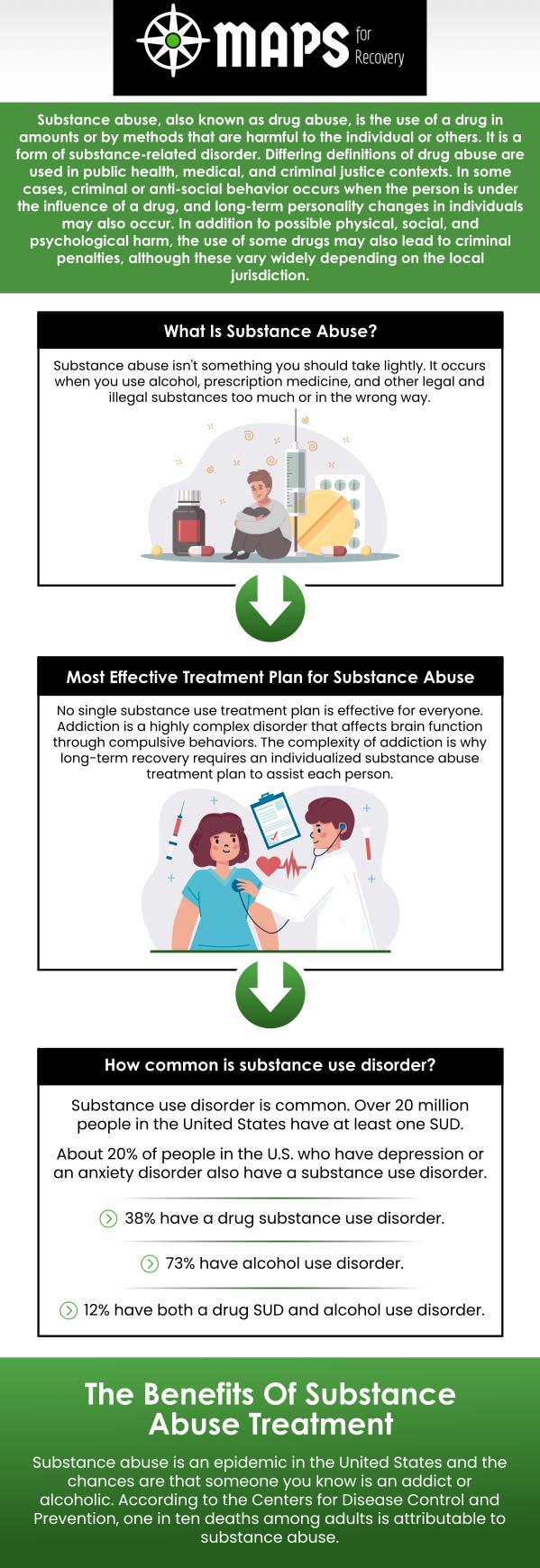Drug Addiction Treatment Clinic in Austin, TX
Drug addiction treatment consists of interventions and therapies designed to assist individuals in overcoming substance abuse and dependency. Seeking Lynn E. Lytton, MD’s assistance is essential for successful drug addiction therapy, which may include a combination of behavioral therapies, counseling, support groups, and medication-assisted treatments. Seek assistance from MAPS for Recovery to overcome your drug addiction and reclaim control of your life. For more information, contact us or schedule an appointment online. We serve patients from Austin, TX and surrounding areas


Table of Contents:
What is drug addiction?
What are the common symptoms of addiction?
Is drug addiction a disease?
How is drug addiction treated?
How can Lynn E. Lytton, MD, at MAPS for Recovery support your journey toward overcoming drug addiction?
Drug addiction, known as substance use disorder, is a condition characterized by the impact of drugs on the brain and behavior, resulting in a loss of control over the use of legal or illegal substances. This includes drugs like alcohol, marijuana, nicotine, as well as prescription medications. Despite the harmful consequences, individuals with addictions continue to use these substances.
The onset of drug addiction can begin with occasional experimentation in social settings, and for some, it progresses to more frequent use. In certain cases, addiction can originate from the misuse of prescribed medications or obtaining them from others who have prescriptions, especially with opioids.
The risk of addiction and the speed at which it develops vary depending on the specific drug. Certain drugs, such as opioid painkillers, have a higher risk and can lead to addiction more rapidly than others.
Over time, individuals may develop a tolerance to the drug, requiring larger doses to achieve the desired effects. Eventually, they may rely on the drug simply to feel normal. As drug use escalates, it becomes increasingly challenging to stop using the substance. Attempts to quit can trigger intense cravings and result in physical discomfort known as withdrawal symptoms.
Common symptoms of addiction can manifest in various ways. Individuals may feel compelled to use the drug regularly, sometimes multiple times a day, and experience strong cravings that consume their thoughts. As time goes on, tolerance may develop, necessitating higher doses of the drug to achieve the desired effect.
People may find themselves taking larger amounts of the drug for an extended period beyond their original intentions. Financial struggles may arise as money is spent on the drug, even when it exceeds one’s financial means.
The impact of addiction can extend to different aspects of life. Obligations and work responsibilities may be neglected, and participation in social or recreational activities may decrease due to drug use. Despite recognizing the problems caused by the drug, individuals continue to use it, disregarding the physical and psychological harm it may bring.
Attempts to quit or reduce drug use often result in failure. Furthermore, withdrawal symptoms may occur when one tries to stop taking the drug, adding to the complexity of addiction’s grip on a person’s life.
Drug addiction, also referred to as substance use disorder, is recognized as a chronic brain disease. It can affect individuals from all walks of life, as addiction does not discriminate. When substance use evolves into an unmanageable pattern that negatively impacts daily functioning, it is classified as a severe substance use disorder.
This can manifest as difficulties in work or school, strained relationships, legal troubles, or financial challenges. Addiction brings about significant changes in the brain, leading to the rewiring of its structure.
The brain’s reward system is activated when engaging in activities we enjoy, with the chemical dopamine playing a crucial role in this process. Drugs and alcohol can trigger the release of dopamine, which contributes to the pleasurable sensations experienced.
Drug addiction is treated through a comprehensive approach that acknowledges it as a complex disease. There is a wide range of treatment options available, both inpatient and outpatient, to address the unique needs of individuals struggling with drug addiction. It is crucial to recognize and manage drug addiction as a medical condition.
Treatment for drug addiction often involves a combination of therapies and medications, tailored to the specific circumstances and requirements of each patient.
Behavioral therapies, such as cognitive-behavioral therapy (CBT) and motivational interviewing, help individuals modify their attitudes and behaviors towards drug use, develop coping strategies, and improve their overall well-being.
Medication-assisted treatment (MAT) is another effective approach that combines medications with counseling and behavioral therapies. Medications such as methadone, buprenorphine, and naltrexone can help reduce cravings, manage withdrawal symptoms, and normalize brain function, enabling individuals to focus on their recovery journey.
Drug addiction is treated through a comprehensive approach that acknowledges it as a complex disease. Get the help you need now and let our team of medical professionals help you on your journey of sobriety! You are not alone, and treatments for drug addiction are only one appointment away! Call us today—you will be glad you did! Drug addiction treatment is available at MAPS for Recovery.
Lynn E. Lytton, MD, at MAPS for Recovery in Austin, TX, offers expert drug addiction treatment tailored to the individual needs of each patient. With a compassionate and holistic approach, Dr. Lytton focuses on addressing the root causes of addiction and providing personalized care to help individuals regain control of their lives. At MAPS for Recovery, patients are supported every step of the way, from initial detox to long-term recovery.
The treatment plan at MAPS for Recovery combines medically supervised detoxification, therapy, counseling, and relapse prevention strategies. Dr. Lytton uses evidence-based practices to help patients manage withdrawal symptoms, reduce cravings, and develop healthier coping mechanisms. The clinic’s goal is to provide a safe, supportive environment that encourages healing, growth, and long-term sobriety.
MAPS for Recovery also recognizes the importance of mental and emotional health in the recovery process. Dr. Lytton’s comprehensive approach includes therapy to address trauma, stress, and underlying issues that contribute to addiction. For more information, contact us or book an appointment online. We serve patients from Austin TX, Georgetown TX, Leander TX, Jonestown TX, Cedar Park TX, Round Rock TX, Rollingwood, TX, Bluff Springs TX, Del Valle TX, and surrounding areas. Visit us online to learn more about our Service Areas.
Check Out Our 5 Star Reviews


ADDITIONAL SERVICES YOU MAY NEED
- Addiction Treatment
- Alcohol Dependence Treatment
- Benzodiazepine Treatment
- Chronic Pain Treatment
- Drug Treatment
- EMDR Therapy
- Heroin Addiction Treatment
- Medical Management of Alcohol Addiction
- Medical Management of Benzodiazepine
- Medical Management of Opiate Addiction
- Opioid Dependence Treatment
- Tobacco Cessation Treatment
- Transitioning off Xanax

ADDITIONAL SERVICES YOU MAY NEED
- Addiction Treatment
- Alcohol Dependence Treatment
- Benzodiazepine Treatment
- Chronic Pain Treatment
- Drug Treatment
- EMDR Therapy
- Heroin Addiction Treatment
- Medical Management of Alcohol Addiction
- Medical Management of Benzodiazepine
- Medical Management of Opiate Addiction
- Opioid Dependence Treatment
- Tobacco Cessation Treatment
- Transitioning off Xanax




